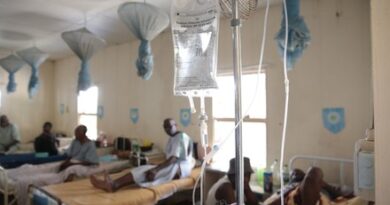14,000 vacant posts in health sector as nurses, pharmacists and doctors are leaving Zimbabwe to work overseas
A MASS exodus of health workers has left the Health and Child Care ministry with 14 000 vacant posts, Health minister Douglas Mombeshora has said.
The government has since approved plans to fill 14 000 new posts in the health sector, with plans to fill 5 284 of them by end of December, in an urgent bid to stop the mass emigration of healthcare professionals that has crippled the country’s hospitals and clinics.
The move comes as the country grapples with an alarming exodus of doctors, nurses and pharmacists lured by better pay and working conditions abroad.
“Our vision is very clear,” Mombeshora said during the official opening of the ministry’s strategic review and planning workshop in Mutare on Tuesday.
“We will build a resilient, equitable and high-performing health system, where resources are used effectively, service reaches every citizen and quality care is a right, not a privilege.”
The chronic staff shortages have left facilities, particularly in rural regions, critically understaffed and overwhelmed, hindering the delivery of essential services.
“We must deploy staff strategically. We should improve working conditions to build a workforce that is competent, professional and motivated,” Mombeshora added, underlining the pressing need for better remuneration, resources and support.
In recent years, thousands of healthcare workers have left Zimbabwe for greener pastures in countries like the United Kingdom, the United States and Australia.
This trend has left hospitals and clinics, particularly in rural regions, critically understaffed and overwhelmed, hindering the delivery of essential health services.
“We must deploy staff strategically,” he said.
“We should improve working conditions to build a workforce that is competent, professional and motivated.”
The minister highlighted that health financing and sustainability are critical priorities as well.
“Donor support is declining and domestic resources must work harder.
“The National Health Insurance Bill, which we plan to table before Parliament by year-end, will provide a stable, sustainable funding base and protect families from catastrophic health expenses,” he explained.
This Bill is expected to create a framework that will allow for equitable healthcare access for all citizens, regardless of their socio-economic status.
“Too often, our central hospitals are overwhelmed because patients do not receive care at lower levels,” Mombeshora added.
“We will invest in community health outreach programmes and preventive care so that health reaches every doorstep.”
Digital health initiatives also featured prominently in Mombeshora’s address, signifying a transformative policy direction for the ministry.
“By investing in digital solutions, we will increase geographical access to services, improve operational efficiency and enhance data management,” he asserted.
The integration of technology into healthcare delivery is poised to revolutionise the way services are accessed and managed, ultimately contributing to better health outcomes.
“We must engage with various stakeholders to be part of this vision,” Mombeshora said.
“A united front will be pivotal in creating a high-performing and resilient health system.”
NewsDay




